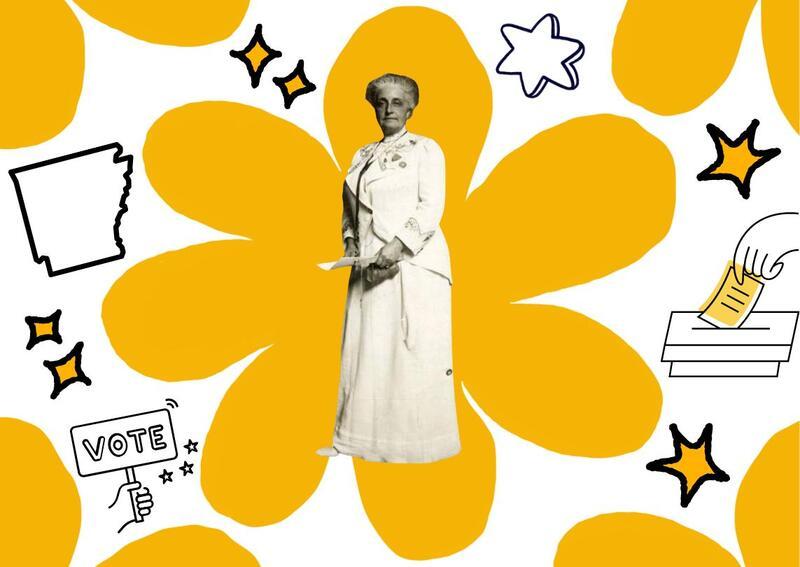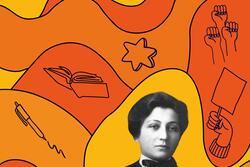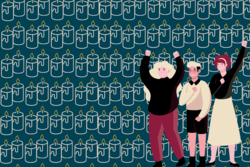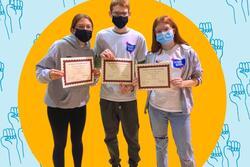Remembering Maud Nathan on Election Day 2022
I woke up at 6:30 to volunteer at the polls this past Election Day. I chugged caffeine and put on my t-shirt and jeans—both chosen to be as nonpartisan as possible, so I avoided red and blue. Though I was late to the church, the polls still didn’t open for another ten minutes, so I introduced myself to the workers and sat down by the ballot box to give voters red, white, and blue “I voted” stickers once they’d cast their ballots. Living where I do, in Arkansas, means the election results were fairly routine and predictable, so much so that my election guesses were all proven correct. All the nationwide seats—US House and US Senate—were solidly Republican, and the spots for our local state House and Senate seats were uncontested Democrat. This ease of prediction came, however, with a sense of disillusionment and hopelessness. Being so intimately involved with the election process highlighted a conflict in me about the nature of American democracy: Why should I vote, I thought, if I knew what the results would be?
Sometimes, I find myself getting bogged down by the constant awareness that we live in some kind of corporate oligarchy, feeling defeated by the sense that the problems facing our country are so vast that we can’t make change. Republican backlash to Biden’s 2020 election seems to reverberate intensely throughout the country, furthering the atmosphere of hopelessness. It becomes difficult to believe there’s anything in your vote that matters after unpopular policies keep dominating the country, from restrictive SCOTUS decisions to laws hurting the rights of members of the LGBT community. At this point, to me, American democracy seems to be some kind of fraud sold under the package of “freedom,” when nothing we do seems to make a difference, even if we cast our votes every other year.
Yet, now more than ever, we must look toward the long legacy of activists, feminists, and Jewish women who did create political change and difference in our country. I find myself particularly looking towards the suffragettes, especially as abortion (re)appears on the ballot in many states. The fight for women’s rights seems eternal. Particularly, I look toward Maud Nathan. She was a Sephardic Jewish activist in New York from the late 19th century, who first attempted to lobby for better working conditions for women. Her failure to pass legislation without the votes of women resulted in her turning to activism for suffrage as she got older. Thus, she inspires me in two ways: both in her advocacy for suffrage and in her advocacy for labor.
Nathan’s primary work was in labor movements, advocating for the rights of working women, for better working conditions and fairer wages. Labor movements have always been a backbone for resistance in a capitalist society. Looking at Nathan’s accomplishments reminds me why I fight. She founded the Consumers’ League of New York, which revealed poor working conditions for women and advised consumers on what products to buy to support more ethical consumption. This kind of journalism was partially instrumental in changing US labor laws. Labor laws in the US have gotten immensely better since the early 20th century, and they would not have changed without the work of tireless activists.
It’s easy to take for granted the rights we have as women. As I worked the polls, I saw countless people who wouldn’t even have had the right to vote 150 years ago. Realizing that I had just taken someone to the voting booth whom our Founding Fathers wouldn’t have allowed to take part in the democratic system was humbling and terrifying, but also inspiring. Maud Nathan was the kind of suffragette who risked rifts with her family and friends over her activism: her sister Anne Nathan Meyer was definitively against the suffrage she campaigned for. People like Nathan were the reason why so many of us can take part in such a vital process for the health of our country. Women going so long without the vote also shows the incredible fragility of the electoral system of the US, as the rights we now assume to be inalienable turn out not to be and are instead reliant on the continual work of activists and politicians. This awareness and legacy further remind me why we must take part in our own democratic system, as hopeless as it may seem. All causes seemed hopeless at one point too. Nathan saw the dream of women voting was not hopeless. She inspires me for her tenacity, and for working on such a daunting task.
Lately, living in Arkansas, where politics seem to move backward, can be incredibly demoralizing. Despite putting my time, effort, and hope into the victory of a particular candidate, it often seems like progressivism will never stand any kind of chance where I live. I turn to the long legacy of Jewish activists to keep faith in the fight. Maud Nathan could never have predicted the new protections for children, the acceptance of a 40-hour work week, or the trust-busting laws we have now when she began her campaigns, and just like her, I can never give up on fighting for what is right. Change is slow, but change is possible.
This piece was written as part of JWA’s Rising Voices Fellowship.







